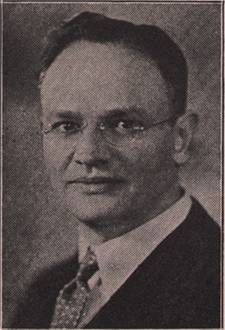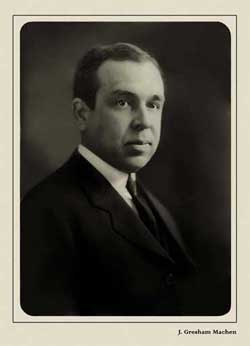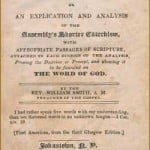With this post, we’re “a day late, and the dollar doesn’t buy what it used to.”
According to this account by Dr. J. Oliver Buswell, Jr., there was apparently some confusion during the Second General Assembly of the Orthodox Presbyterian Church [nee Presbyterian Church of America], over the matter of how exactly to dispose of the 1903 PCUSA amendments to the Westminster Confession. Buswell writes here in THE CHRISTIAN BEACON, 17.17 (5 June 1952): 2, 4.
THE WESTMINSTER CONFESSION AND THE AMENDMENTS OF 1903.
We who are Calvinists are such not because we admire the work of a man, but because we admire the work of a man who clearly expounded the system of doctrine taught in the Scriptures. When we speak of great historical Calvinistic documents the word “Calvinistic” signifies the preservation in sharp and clear outline of what the Bible teaches. The Westminster Confession of Faith, for example, is a basic document for all English-speaking Presbyterian, Reformed, Congregational, and Baptist churches. The Savoy Confession of the historical Congregational Churches (Congregationalism before the apostasy of that denomination) is The Westminster Confession with a change in one chapter only. The Philadelphia Confession, which is a basic document for large groups of Baptist churches in the Southern states and in England, is The Westminster Confession with changes in two chapters only. The New Hampshire Confession, which is accepted by many Baptist churches in the Northern states is largely adapted from The Westminster Confession. It is therefore an interdenominational document in the truest sense. It is a rich deposit of treasure in the common heritage of Bible-believing Christians. We Calvinists accept The Westminster Confession not as being an infallible document, not as being verbally inerrant, but as being thoroughly based upon the Scriptures, and as setting forth in clear and positive language the integrated system of doctrine which the Scriptures teach.
In 1903 the Presbyterian Church in the U.S.A. adopted certain amendments in order to please groups which were doctrinally weak and poorly instructed. Dr. Benjamin Warfield, one of the greatest Calvinistic teachers of the past generation, strongly protested against the adoption of these amendments, but when they were adopted, Dr. Warfield declared (as Dr. J. Gresham Machen related the matter to me) that these amendments, weak and misleading as they were, did not actually change “the system of doctrine.”
In the months preceding May, 1936, Dr. Machen explained to me that he did not wish to take his stand as contending for any change in the constitution of the Church (Presbyterian, U.S.A.) as it then existed, though he hoped that the amendments of 1903 might sometime be eliminated. His great fight at that time was that the Foreign Mission Board (and other agencies of the Church) might at least be true to the simple elementary principles of the Gospel. He could be loyal to the constitution as it was then, since, as Dr. Warfield had said, the constitution, in spite of the weak and misleading character of the 1903 amendments, still set forth the system of doctrine taught in the Scriptures.
I understood Dr. Machen to advocate that if we should be compelled to form a new church, it would be wise to start with the doctrinal constitution just as it had been in the U.S.A. Church at the time the controversy arose. It was on this basis that Dr. Machen organized the Independent Board for Presbyterian Foreign Missions.
In May, 1936, Dr. Machen and the rest of us were unfrocked and put out of the Presbyterian Church in the U.S.A. An incident took place in the fall of 1936 at the Second General Assembly of the Presbyterian Church of America which, I have recently learned, has caused confusion in the minds of some of our friends. I am glad to take this occasion to make a correction. The incident was as follows : When the proposal to adopt the Westminster Standards came before the Assembly, as moderator, I suggested that it would expedite matters if we adopted the Standards as they then existed in the U.S.A. Church, and then proceeded with deliberation to remove the 1903 amendments and make such a declaratory statement as might seem appropriate. At this point Dr. Machen gained the impression that I had somehow changed my convictions, and that I wished the amendments of 1903 to be retained, which certainly was not the case. He made a forceful address urging the adoption the Confession without the 1903 amendments. I could readily see that either I had misunderstood his former opinions, or he had changed his mind. I did not consider the matter worth a reply, since we were all agreed that the 1903 amendments should ultimately be eliminated.
I should never had referred to the matter again had I not been informed rather recently that some sound Calvinistic bodies overseas have been told that “the Bible Presbyterian Church is un-Calvinistic, since one of the leaders of the Bible Presbyterian Church, moderator of the Second General Assembly of the Presbyterian Church of America, actually spoke in defense of the weak and misleading 1903 amendments of the Westminster Confession.”! I did not at any time speak in defense of the 1903 amendments. When the Bible Presbyterian Church was formed, it adopted The Westminster Confession, without the objectionable 1903 amendments.
[excerpted from The Christian Beacon, vol. 17, no. 17 (5 June 1952), pages 2, 4.]



